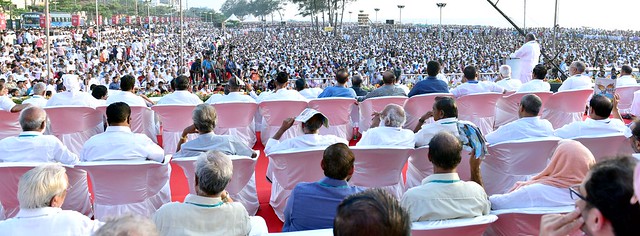By Shafeeq Hudawi, TwoCircles.net
Kozhikode: The two major factions of the Kerala Nadvathul Mujahideen (KNM) formally merged at a mega conference held in the city on Tuesday. The merge was materialised after a series of discussions which date back to December 2015.
 KNM state president T P Abdulla Koya Madani inaugurating the reunion conference of Mujahids at Kozhikode beach on Tuesday
KNM state president T P Abdulla Koya Madani inaugurating the reunion conference of Mujahids at Kozhikode beach on Tuesday“It’s time to get rid of the compulsions of the past and join hands for the empowerment of the community,” said KNM leader Dr Husain Madavur.
The split among the Salafis, better known as Mujahids in Kerala, occurred in August 2002 due to ideological and personal issues. Led by Hussain Madavur, a sect of scholars broke away from KNM while the mother organisation was led by T P Abdullakkoya Madani.
Several recent challenges confronting the Muslim community in the country including the suspected case of Muslim youths joining Islamic State, Uniform Civil Code and the move against Zakir Naik and Peace International School have led to the the merge.
The reunion, according to Madavur, assumes significance at a time when the Muslims and their institutions are openly targeted. “Unlike the previous decades, the scenario is quite different as the right groups leave no stones unturned against Muslims by making use of the power in Centre. The cases, in which Muslims are involved are directly taken over by National Investigation Agency (NIA). The community in dire need of uniting its voice against fascism,” he said.
Besides, according to Sufyan Abdul Sathar, columnist and research scholar at English and Foreign Languages University (EFLU), Hyderabad, the merge will strengthen the educational institutions, run by the two organisations across the state.
There are more than 30 institutions run by the two organisations in Islamic higher education while hundreds of schools and primary Islamic educational institutions are functioning under two separate managements in Kerala.
As per an agreement, the institutions will be run by the old managements but representation will be given for the opposition group in all managements. After three years, the managements will be reshuffled.
In addition to this, the social welfare and charity projects, initiated by the two organizations will also take a new turn.
“The two organizations will abstain from blame game and ideological disputes. This will help them save time and energy and they can spend more time for the well being of the community,” said Sufyan.
Ranging from micro finance schemes to palliative care, the two organisations are running several projects across the state.
Madavur said that the prime stress will be given to reformation of the community. “There are several gaps to be filled. The community still remains in the vicinity of superstitions. Joint efforts needed to reform the community,” he said.
As per the decision, feeder organisations such as Ithihadu Shubbanil Mujahideen (ISM), Mujahid Girls Movement (MGM) and Mujahid Students Movement (MSM) will work under new committees.
IUML to benefit from reunion
IUML had been taking efforts for the reunion of the two organisations. IUML leaders like P K Kunhalikkutty, E T Mohammed Basheer and P V Abdul Wahab had been mediating between the two organisations following instructions by former IUML president Panakkad Mohammed Ali Shihab Thangal.
The party, according to ISM state vice president Nisar Olavanna, was drawn towards the mediation in order to ensure the political unity of Muslims in Kerala. Nisar said that the two organisations’ stand would be in favour of IUML.
Reunion conference calls for efforts towards unity
The reunion mass conference called for efforts for the unity against communal polarization.
While inaugurating the conference, KNM president T P Abdulla Koya Madani said that the reunion was need of the hour. “Mujahid movement has influenced religious, social, educational and political sectors of Muslims in Kerala. The movement will survive all challenges,” Madani said referring to the recent incidents, where religious institutions were targeted by police, media and Sangh fold.
Resolutions against Uniform Civil Code and terrorism
Ten resolutions were passed in the convention, including ones against terrorism and extremism and the move to implement Uniform Civil Code. Resolutions also demanded steps to stop legal actions against innocents and efforts to retain the communal harmony. The convention, through a resolution, urged the authorities to enact a law against spiritual exploitation and steps to resolve the woes generated by demonetisation.

